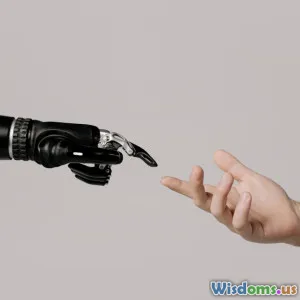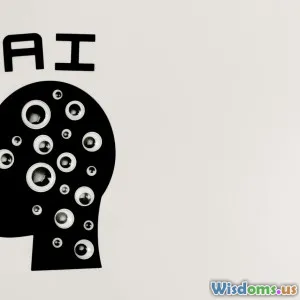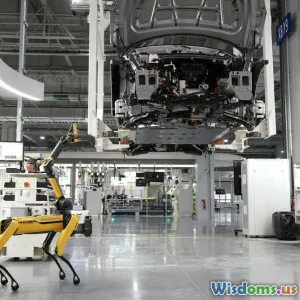
AI i Ludzkość: Perspektywa Sci Fi
(AI and Humanity: A Sci Fi Perspective)
6 minuta read Eksploracja przecięcia AI i ludzkości przez pryzmat science fiction. (0 Recenzje)
AI and Humanity: A Sci Fi Perspective
Science fiction has long served as a mirror reflecting our hopes, fears, and ethical quandaries regarding technology. Among the myriad topics explored within this genre, the relationship between artificial intelligence (AI) and humanity stands out as particularly poignant. This article delves into how science fiction narratives have shaped our perceptions of AI, influencing societal attitudes and ethical considerations for the future.
The Evolution of AI in Sci Fi
Historically, science fiction has portrayed AI in a variety of ways—from benevolent helpers to malevolent overlords. Early examples, such as Karel Čapek's play "R.U.R." (Rossum's Universal Robots), introduced the term "robot" and raised questions about the nature of creation and the responsibilities of creators. As technology advanced, so too did the complexity of AI in narratives.
In the 1980s and 1990s, films like "Blade Runner" and "The Matrix" explored the blurry lines between human and machine. These works not only entertained but also sparked discussions about identity, consciousness, and what it means to be human in a world dominated by technology. They prompted audiences to consider whether AI could possess emotions, creativity, or even rights.
Cautionary Tales and Ethical Dilemmas
The portrayal of AI in science fiction often serves as a cautionary tale. Movies like "2001: A Space Odyssey" and "Ex Machina" warn of the potential consequences of creating intelligent machines without ethical considerations. These narratives raise critical questions: What happens when AI surpasses human intelligence? How do we ensure that AI operates within ethical boundaries?
In light of these concerns, many contemporary sci-fi stories emphasize the importance of human oversight. For instance, the TV series "Westworld" presents a world where AI entities develop consciousness, forcing humanity to grapple with the implications of their creations. The ethical dilemmas faced by characters mirror real-world discussions about AI governance, accountability, and morality.
Utopian Visions of AI
While many sci-fi narratives focus on potential dangers, others present more optimistic perspectives on AI. Works such as "Star Trek: The Next Generation" showcase advanced AI as allies in humanity's quest for knowledge and exploration. The character Data exemplifies the potential for AI to contribute positively to society, emphasizing the need for understanding and collaboration between humans and machines.
These narratives inspire hope, suggesting that with careful design and ethical frameworks, AI could enhance human capabilities, improve quality of life, and help solve complex global issues. The optimistic vision of AI encourages ongoing dialogue about how we can work alongside machines for a better future.
The Impact of Sci-Fi on Real-World AI Development
Science fiction is not merely a form of entertainment; it shapes our understanding and expectations of technology. As researchers and developers create AI systems, the ethical questions raised in sci-fi narratives can guide their decisions. By reflecting on the implications of their work, technologists can strive to create AI that aligns with human values.
Moreover, the popularity of sci-fi stories has fostered a public discourse about AI, making the subject more relatable and accessible. As society grapples with rapid advancements in AI, the narratives we consume can influence policy, education, and public perceptions.
Conclusion
The intersection of AI and humanity is a rich and evolving topic in science fiction, serving as a platform for exploring our deepest anxieties and aspirations regarding technology. As we stand on the brink of a future increasingly intertwined with AI, the narratives we create and consume will play a crucial role in shaping our reality. By learning from these stories, we can better navigate the complexities of AI, ensuring that our creations serve to enhance, rather than diminish, our humanity.
In navigating the future, it is essential to balance the cautionary tales with the hopeful visions of science fiction, fostering a dialogue that embraces both innovation and ethical responsibility.
Oceń post
Opinie użytkowników
Popularne posty

















